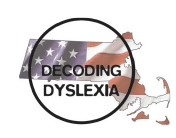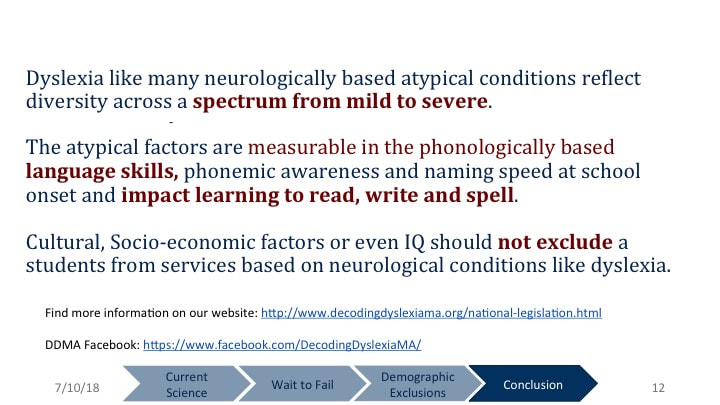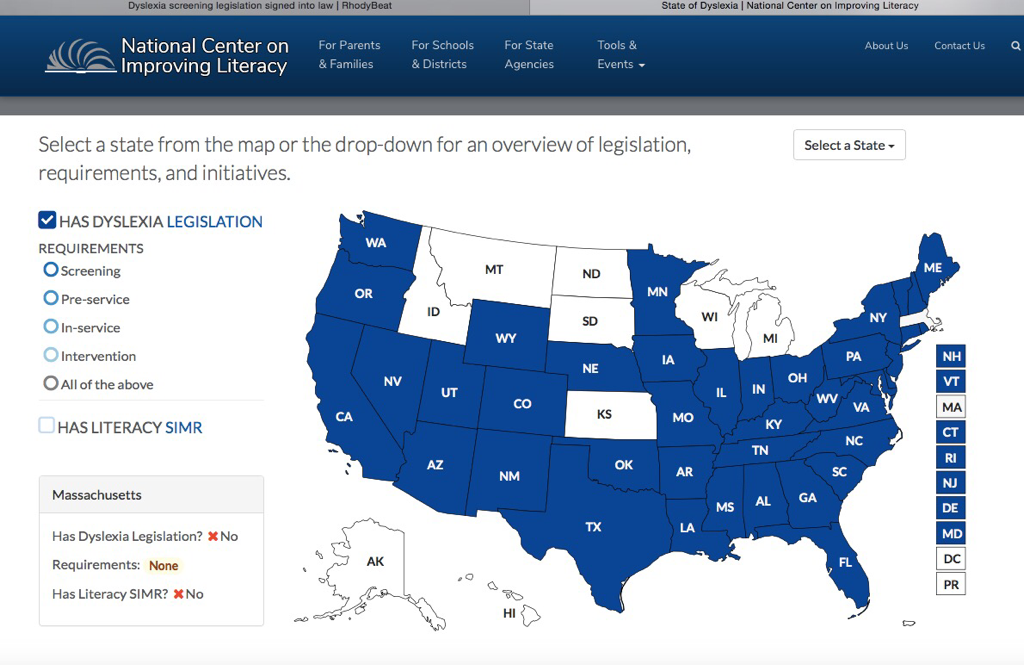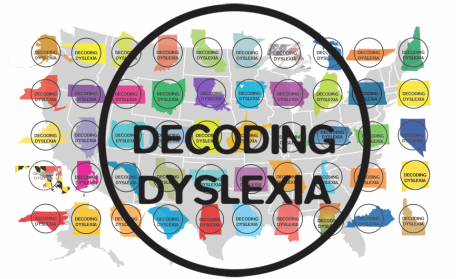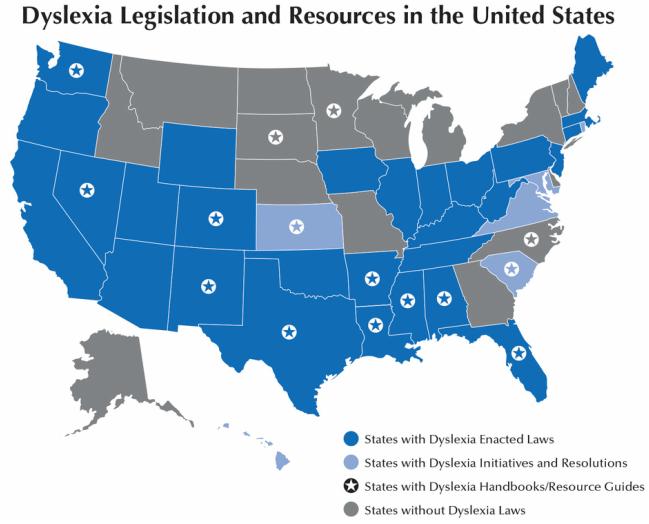I.D.E.A. laws may not seem to perfect to families whose students with dyslexia have had to fight for services. But there are some important parts of the laws we should all support keeping in place.
Particularly, for all kids who struggle with reading,
20 U.S.C. § 6368(3)(4)(5)(6)(7). Follow this link to learn more about some important details for IDEA and Dyslexia, including the October 2015 Dyslexia Guidance provided by OSERS.
Which Federal or National Policies Need to Change?
How Can Families Advocate for Change?
Removing Barriers:
Changing I.D.E.A. Regulations to Reflect the Neuroscience of Dyslexia
For far too many, receiving the services that enable learning, based on learning disability, like dyslexia and other SLD conditions, has become a frustrating quagmire of diagnostic, educational, and legal-regulatory roadblocks.
Consideration for new qualifying categories or more scientifically accurate definitions of SLD conditions is needed to improve access to services.
This brief paper sets out to explain why the faults of the current system need to be clearly understood.
What is causing delays or denial of services and what can be done?
The document below, Removing Barriers: Changing I.D.E.A. Regulations to Reflect the Neuroscience of Dyslexia 5/2018 explains concerns that, in the case of dyslexia and other conditions listed in I.D.E.A. regulations for the category of Specific Learning Disability, regulations can be used delay and deny services rather than ensure a Free and Appropriate Education. If you have experienced this wait to fail or delay and deny due to subjective irrelevant demographic info rather than support for a real and well researched neurological disability - contact your legislators and advocate for change.
Consideration for new qualifying categories or more scientifically accurate definitions of SLD conditions is needed to improve access to services.
This brief paper sets out to explain why the faults of the current system need to be clearly understood.
What is causing delays or denial of services and what can be done?
The document below, Removing Barriers: Changing I.D.E.A. Regulations to Reflect the Neuroscience of Dyslexia 5/2018 explains concerns that, in the case of dyslexia and other conditions listed in I.D.E.A. regulations for the category of Specific Learning Disability, regulations can be used delay and deny services rather than ensure a Free and Appropriate Education. If you have experienced this wait to fail or delay and deny due to subjective irrelevant demographic info rather than support for a real and well researched neurological disability - contact your legislators and advocate for change.
| removing_barriers__changing_i.d.e.a._regulations_to_reflect_the_neuroscience_of_dyslexia_2019.pdf | |
| File Size: | 243 kb |
| File Type: | |
Supporting Resources and Further Information
Resources of the neurobiology of dyslexia and the ability to identify it before reading instruction at age 4 and 5.
Longitudinal stability of pre-reading skill profiles of kindergarten children: implications for early screening and theories of reading Ola Ozernov-Palchik,1,3,5 Elizabeth S. Norton,2,3,4 Georgios Sideridis,5,6 Sara D. Beach,3,4,6 Maryanne Wolf,1 John D.E. Gabrieli3,4 and Nadine Gaab 5,6,7
ozernovpalchik_etal_2016-2.pdf
Norton, Elizabeth S., Sara D. Beach, and John D. E. Gabrieli. “Neurobiology of Dyslexia.” Current opinion in neurobiology 0 (2015): 73–78. PMC. Web. 31 Mar. 2018
https://www.ncbi.nlm.nih.gov/pmc/articles/PMC4293303/
Language at the Speed of Sound, by Mark Seidenberg https://seidenbergreading.net
Resources indicating that students are not accessing the specialized reading instruction based on scientifically based reading research for dyslexia. Systematically, the regulations exclude students based on subjective and unscientific methods, like income and culture, otherwise in need on services.
Dyslexia & Literacy in High- Risk & Diverse Populations: Issues in Literacy Among Low Socio-Economic Status Populations,
Nicole Patton Terry, Ph.D., Executive Director,The Urban Child Study Center [email protected] (The Dyslexia Foundation Fall 2015 Conference)
Executive Director,
The Urban Child Study Center [email protected]
The Dyslexia Foundation Fall 2015 Conference
Longitudinal stability of pre-reading skill profiles of kindergarten children: implications for early screening and theories of reading Ola Ozernov-Palchik,1,3,5 Elizabeth S. Norton,2,3,4 Georgios Sideridis,5,6 Sara D. Beach,3,4,6 Maryanne Wolf,1 John D.E. Gabrieli3,4 and Nadine Gaab 5,6,7
ozernovpalchik_etal_2016-2.pdf
Norton, Elizabeth S., Sara D. Beach, and John D. E. Gabrieli. “Neurobiology of Dyslexia.” Current opinion in neurobiology 0 (2015): 73–78. PMC. Web. 31 Mar. 2018
https://www.ncbi.nlm.nih.gov/pmc/articles/PMC4293303/
Language at the Speed of Sound, by Mark Seidenberg https://seidenbergreading.net
Resources indicating that students are not accessing the specialized reading instruction based on scientifically based reading research for dyslexia. Systematically, the regulations exclude students based on subjective and unscientific methods, like income and culture, otherwise in need on services.
Dyslexia & Literacy in High- Risk & Diverse Populations: Issues in Literacy Among Low Socio-Economic Status Populations,
Nicole Patton Terry, Ph.D., Executive Director,The Urban Child Study Center [email protected] (The Dyslexia Foundation Fall 2015 Conference)
Executive Director,
The Urban Child Study Center [email protected]
The Dyslexia Foundation Fall 2015 Conference
The National Center for improving Literacy
Funded by the READ ACT 2017
improvingliteracy.org
This website is federally funded and provides accurate information and resources for educators and families.
On the page for the State of Dyslexia you can see a map showing which states have some type of legislation concerning dyslexia. Some involve studies or pilot programs others screening and information.
In July 2018 Alaska, Wisconsin, and Kansas passed Dyslexia Legislation.
On the page for the State of Dyslexia you can see a map showing which states have some type of legislation concerning dyslexia. Some involve studies or pilot programs others screening and information.
In July 2018 Alaska, Wisconsin, and Kansas passed Dyslexia Legislation.
Decoding Dyslexia National Group
National Legislation
Encourage your US Representative to join the Bipartisan Congressional Dyslexia Caucus.
Sign the National Legalize Dyslexia: Grant Accommodations to Dyslexic Students for High Stakes Testing. (Petition)
Sign the National Legalize Dyslexia: Grant Accommodations to Dyslexic Students for High Stakes Testing. (Petition)
Please learn more about and help with our efforts to improve education for students with dyslexia.
There is information that can be helpful to you
There is information that can be helpful to you
- Understand current policies in Massachusetts and federal or national policies that effect education.
- Follow our guidelines to contact legislators and policy makers and have your voice heard on these issues.
Dyslexia Laws in the USA: An Update
by Martha Youman and Nancy Mather
As of December of 2015, 28 states had statewide dyslexia laws, 6 states had initiatives or resolutions related to dyslexia, and 14 states had handbooks or resource guides to inform parents and educators about proper procedures for students in public and private educational settings. The laws, particularly those being passed in the last five years, focus primarily upon a) dyslexia awareness, b) pilot programs for screening and intervention, c) teacher training, d) provision of interventions and accommodations,
and e) overall rights for individuals with dyslexia.
and e) overall rights for individuals with dyslexia.
Read the full article below
Your browser does not support viewing this document. Click here to download the document.
